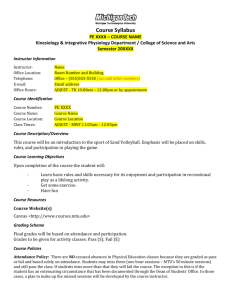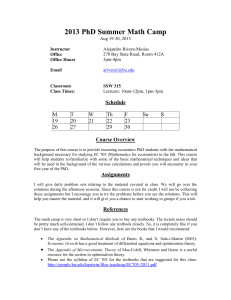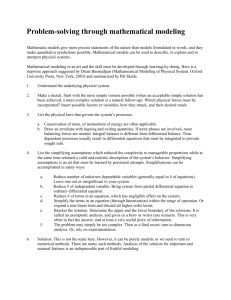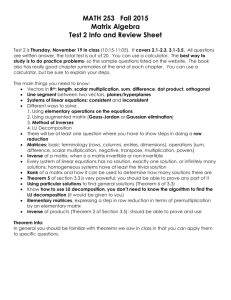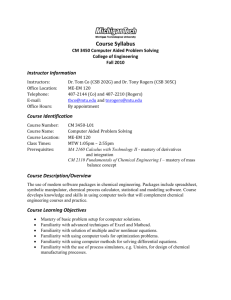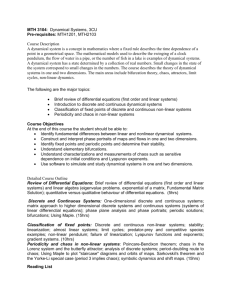Course Syllabus - Michigan Technological University
advertisement
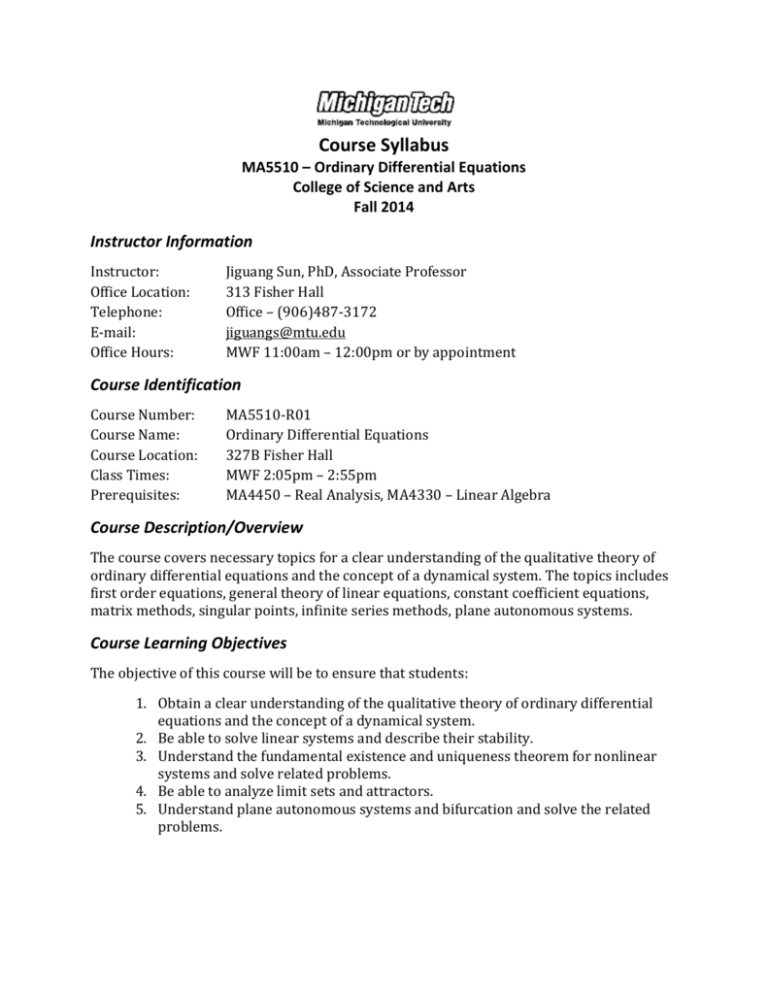
Course Syllabus MA5510 – Ordinary Differential Equations College of Science and Arts Fall 2014 Instructor Information Instructor: Office Location: Telephone: E-mail: Office Hours: Jiguang Sun, PhD, Associate Professor 313 Fisher Hall Office – (906)487-3172 jiguangs@mtu.edu MWF 11:00am – 12:00pm or by appointment Course Identification Course Number: Course Name: Course Location: Class Times: Prerequisites: MA5510-R01 Ordinary Differential Equations 327B Fisher Hall MWF 2:05pm – 2:55pm MA4450 – Real Analysis, MA4330 – Linear Algebra Course Description/Overview The course covers necessary topics for a clear understanding of the qualitative theory of ordinary differential equations and the concept of a dynamical system. The topics includes first order equations, general theory of linear equations, constant coefficient equations, matrix methods, singular points, infinite series methods, plane autonomous systems. Course Learning Objectives The objective of this course will be to ensure that students: 1. Obtain a clear understanding of the qualitative theory of ordinary differential equations and the concept of a dynamical system. 2. Be able to solve linear systems and describe their stability. 3. Understand the fundamental existence and uniqueness theorem for nonlinear systems and solve related problems. 4. Be able to analyze limit sets and attractors. 5. Understand plane autonomous systems and bifurcation and solve the related problems. Course Resources Course Website(s) Canvas<http://www.courses.mtu.edu> Personal Website <http://www.mtu.edu/~jiguangs> Required Course Text Differential Equations and Dynamical System, 3rd Edition, by Lawrence Perko, ©2001 Springer, ISBN 0-387-95116-4 Grading Scheme Grading System Letter Grade A AB B BC C CD D F I X Grade Percentage points/credit Rating 90% & above 4.00 Excellent 85% – 89% 3.50 Very good 80% – 84% 3.00 Good 75% – 79% 2.50 Above average 70% – 74% 2.00 Average 65% – 69% 1.50 Below average 60% - 64% 1.00 Inferior 59% and below 0.00 Failure Incomplete; given only when a student is unable to complete a segment of the course because of circumstances beyond the student’s control. Conditional, with no grade points per credit; given only when the student is at fault in failing to complete a minor segment of a course, but in the judgment of the instructor does not need to repeat the course. It must be made up by the close of the next semester or the grade becomes a failure (F). A (X) grade is computed into the grade point average as a (F) grade. Grading Policy Grades will be based on the following: Homework Midterm Exam Final Exam Total 50% 20% 30% 100% Late Assignments Late assignments will be returned without grading. Collaboration/Plagiarism Rules Collaboration on homework is encouraged. However, the final work needs to be done independently. Cell phones, Blackberries, iPods, PDAs, or any other electronic devices are not to be used in the classroom. Please make sure to bring a calculator with you to class. Calculators on other devices are strictly prohibited. Information exchanges on these devices during class are also prohibited and violate the Academic Integrity Code of Michigan Tech. University Policies Michigan Tech has standard policies on academic misconduct and complies with all federal and state laws and regulations regarding discrimination, including the Americans with Disabilities Act of 1990. For more information about reasonable accommodation for or equal access to education or services at Michigan Tech, please call the Dean of Students Office, at (906) 487- 2212 or go to http://www.mtu.edu/provost/faculty-resources/syllabus-policies/ Further Information: Academic Integrity: http://www.mtu.edu/dean/conduct/policy/academic-integrity Academic regulations and procedures are governed by University policy. Academic misconduct cases will be handled in accordance the University's policies. Disability Services: http://www.mtu.edu/dean/disability/policies/ If you have a disability that could affect your performance in any class or that requires an accommodation under the Americans with Disabilities Act, please contact your instructor as soon as possible so that appropriate arrangements can be made. Affirmative Programs: http://www.admin.mtu.edu/aao/ The Affirmative Programs Office has asked that you be made aware of the following: Michigan Technological University complies with all federal and state laws and regulations regarding discrimination, including the Americans with Disabilities Act of 1990. If you have a disability and need a reasonable accommodation for equal access to education or services at Michigan Tech, please call the Dean of Students Office at 487-2212. Equal Opportunity, Discrimination, or Harassment Statement: http://www.admin.mtu.edu/admin/boc/policy/ch5/ For other concerns about discrimination, you may contact your advisor, Chair/Dean of your academic unit, or the Affirmative Programs Office at 487-3310. Course Schedule (Tentative) Week 1 W 9/3 Course introduction 1.1 Uncouple Linear System Week 2 M 9/8 W 9/10 F 9/12 1.2 Diagonalization 1.3 Exponentials of Operators 1.4 The Fundamental Theorem for Linear Systems Week 3 M 9/15 W 9/17 F 9/19 1.5 Linear Systems in R^2 1.6 Complex Eigenvalues 1.7 Multiple Eigenvalues Week 4 M 9/22 W 9/24 F 9/26 1.8 Jordan Forms 1.9 Stability Theory 1.9 Stability Theory Week 5 M 9/29 W 10/1 F 10/3 1.10 Nonhomogeneous Linear Systems 2.1 Some Preliminary Concepts and Definitions 2.2 The Fundamental Existence-Uniqueness Theorem Week 6 M 10/6 W 10/8 F 10/10 2.2 The Fundamental Existence-Uniqueness Theorem 2.3 Dependence on Initial Conditions and Parameters 2.4 The Maximal Interval of Existence Week 7 M 10/13 W 10/15 F 10/17 2.5 The Flow Defined by a Differential Equation 2.6 Linearization 2.9 Stability and Liapunov Fuctions Week 8 M 10/20 W 10/22 F 10/24 2.10 Saddles, Nodes, Foci and Centers Review Midterm Week 9 M 10/27 3.1 Dynamical Systems and Global Existence Theorems W 10/29 F 10/31 3.2 Limit Sets and Attractors 3.3 Periodic Orbits, Limit Cycles and Separatrix Cycles Week 10 M 11/3 W 11/5 F 11/7 3.4 The Poincare Map 3.5 The Stable Manifold Theorem for Periodic Orbits Review Week 11 M 11/10 W 11/12 F 11/14 4.1 Structural Stability and Peixoto’s Theorem 4.2 Bifurcations at Nonhyperbolic Equilibrium Points 4.3 Higher Codimension Bifurcations at Nonhyperbolic Equilibrium Points Week 12 M 11/17 W 11/19 F 11/21 4.4 Hopf Bifurcations and Bifurcation of Limit Cycles from a Multiple Focus 4.5 Bifurcations at Nonhyperbolic Equilibrium Points Review Week 13 M 12/1 W 12/3 F 12/5 Supplemental Material 1 Supplemental Material 2 Supplemental Material 3 Week 14 M 12/8 W 12/10 F 12/12 Review Review Review Finals Week TDB

